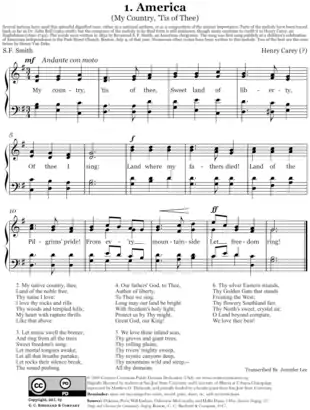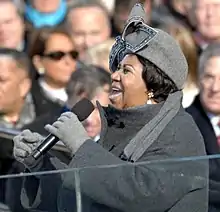America (My Country, 'Tis of Thee)
"America (My Country, 'Tis of Thee)" is an American patriotic song, the lyrics of which were written by Samuel Francis Smith.[2] The melody used is the same as that of the national anthem of the United Kingdom, "God Save the Queen". The song served as one of the de facto national anthems of the United States (along with songs like "Hail, Columbia") before the adoption of "The Star-Spangled Banner" as the official U.S. national anthem in 1931.[3]

History
Samuel Francis Smith wrote the lyrics to "America" in 1831[4] while a student at the Andover Theological Seminary in Andover, Massachusetts. The church-music composer Lowell Mason, a friend, had asked him to translate the lyrics in some German school songbooks into English, or to write new lyrics for the same tunes. The "God Save the Queen" melody in Muzio Clementi's Symphony No. 3 (also called "The Great National", written as a tribute to Clementi's adopted country) caught Smith's attention at the time; rather than translating lyrics from the German, he wrote his own American patriotic hymn to the melody, completing the lyrics in thirty minutes.
Smith gave Mason the lyrics he had written, and the song was first performed in public on July 4, 1831,[4] at a children's Independence Day celebration at Park Street Church in Boston. The first publication of "America" was in 1832.[4]
Lyrics
My country, 'tis of thee,
Sweet land of liberty,
Of thee I sing;
Land where my fathers died,
Land of the pilgrims' pride,
From ev'ry mountainside
Let freedom ring!
My native country, thee,
Land of the noble free,
Thy name I love;
I love thy rocks and rills,
Thy woods and templed hills;
My heart with rapture thrills,
Like that above.
Let music swell the breeze,
And ring from all the trees
Sweet freedom's song;
Let mortal tongues awake;
Let all that breathe partake;
Let rocks their silence break,
The sound prolong.
Our fathers' God to Thee,
Author of liberty,
To Thee we sing.
Long may our land be bright,
With freedom's holy light,
Protect us by Thy might,
Great God our King!
Additional verse to celebrate Washington's Centennial:[5]
Our joyful hearts today,
Their grateful tribute pay,
Happy and free,
After our toils and fears,
After our blood and tears,
Strong with our hundred years,
O God, to Thee!
Abolitionist version
An Abolitionist version was written, by A. G. Duncan, 1843.[6]
My country, 'tis of thee,
Stronghold of slavery, of thee I sing;
Land where my fathers died,
Where men man's rights deride,
From every mountainside thy deeds shall ring.
My native country, thee,
Where all men are born free, if white's their skin;
I love thy hills and dales,
Thy mounts and pleasant vales;
But hate thy negro sales, as foulest sin.
Let wailing swell the breeze,
And ring from all the trees the black man's wrong;
Let every tongue awake;
Let bond and free partake;
Let rocks their silence break, the sound prolong.
Our father's God! to thee,
Author of Liberty, to thee we sing;
Soon may our land be bright,
With holy freedom's right,
Protect us by thy might, Great God, our King.
It comes, the joyful day,
When tyranny's proud sway, stern as the grave,
Shall to the ground be hurl'd,
And freedom's flag, unfurl'd,
Shall wave throughout the world, O'er every slave.
Trump of glad jubilee!
Echo o'er land and sea freedom for all.
Let the glad tidings fly,
And every tribe reply,
"Glory to God on high", at Slavery's fall!
Notable performances
- Marian Anderson performed the song at the Lincoln Memorial on Easter Sunday, April 9, 1939.
- In the 1961 musical film West Side Story (1961 film), when the Puerto Rican gang is forced to leave a "war council" by a policeman, they whistle the anthem.[7]
- Martin Luther King Jr. recited the first verse of the song toward the end of his famous "I Have a Dream" speech at the Lincoln Memorial during the March on Washington for Jobs and Freedom on August 28, 1963.[8]
- Cary Grant and Jim Hutton sang the first verse in the 1966 film Walk, Don't Run, while simultaneously Grant and Samantha Eggar sang "God Save the Queen".
- Crosby, Stills & Nash performed the song on the first episode of The Tonight Show with Jay Leno to air after the September 11 attacks in 2001.[9]
- On January 20, 2009, Aretha Franklin sang the song at the first inauguration of Barack Obama.
- On January 21, 2013, Kelly Clarkson sang the song at the public inauguration ceremony of the second inauguration of Barack Obama.
- It was played at Senator John McCain's funeral service at the Washington National Cathedral on Sep 1, 2018.[10]
- The Doors used a guitar riff of the song at the beginning of their song "L.A. Woman" on the 40th anniversary editions of L.A. Woman in 2001 and on The Very Best of The Doors 2007 re-release.
- Madonna and Steven Klein sing some verses of the song in their Secret Project video.[11]
- Dan Berggren updated the song's lyrics in 2004 in a version slanted towards the environment and freedom. It appears as "From Every Mountain Side" on the 2006 Sleeping Giant Records album Fresh Territory.[12]
- Alec Benjamin sings the first two lines of the song in his song titled "1994".
See also
Other anthems set to the same music:
- "God Save the Queen"
- "Heil dir im Siegerkranz"
- "Kongesangen"
- "Oben am jungen Rhein"
- "The Prayer of Russians"
- "Rufst du, mein Vaterland"
Organ variations by Charles Ives:
References
- Free scores of "My country, 'tis of thee" #16830 in the Choral Public Domain Library (ChoralWiki), PDF
- "My Country, 'Tis of Thee". The Gilder Lehrman Institute of American History. Archived from the original on 2014-12-07. Retrieved December 6, 2014.
- Snyder, Lois Leo (1990). Encyclopedia of Nationalism. Paragon House. p. 13. ISBN 1-55778-167-2.
- Garraty, John A. & Carnes, Mark C., eds. (1999). American National Biography. 20. New York: Oxford University Press. p. 281.
- Andrews, E. Benjamin (1912). History of the United States. New York: Charles Scribner's Sons.
-
Jarius Lincoln, [ed.] Antislavery Melodies: for The Friends of Freedom. Prepared for the Hingham Antislavery Society. Words by A. G. Duncan. (Hingham, [Mass.]: Elijah B. Gill, 1843), Hymn 17 6s & 4s (Tune – "America") pp. 28–29.
Some of these verses can be heard in the recording of the Arizona State University Antislavery Ensemble. "My Country ‘Tis of Thee" (Vimeo). Arizona State University – Department of English. March 1, 2006. Retrieved May 17, 2019.. - Wise, Robert. "West Side Story (1961 film) Part 3 Summary and Analysis | GradeSaver". www.gradesaver.com. Retrieved 8 December 2020.
- Hansen, Drew D. (2003). The Dream: Martin Luther King, Jr. and the Speech that Inspired a Nation. New York: Harper Collins. p. 83.
- Keveney, Bill (September 19, 2001). "Audience identifies with low-key Leno". USA Today. Retrieved July 3, 2009.
- "Was God Save the Queen played at John McCain's funeral?". BBC News. 1 September 2018. Retrieved 3 September 2019.
- Art For Freedom. "Art For Freedom". Archived from the original on 2013-09-07. Retrieved 2013-09-04.
- Dan Berggren (2004). "From Every Mountainside". soundcloud.com.
Bibliography
- Collins, Ace (2003). Songs Sung, Red, White, and Blue: The Stories Behind America's Best-Loved Patriotic Songs. HarperResource. ISBN 0060513047.
- Music, David M.; Richardson, Paul A. (2008). I Will Sing the Wondrous Story: A History of Baptist Hymnody in North America. Macon, Georgia: Mercer University Press. ISBN 978-0865549487.
External links
| Wikisource has original text related to this article: |
- Page about the song at the Library of Congress, with scans, etc.
- Public Domain version of the sheet music in multiple formats for viewing, printing, editing, etc. – (from the Choral Public Domain Library)
- Review of a book about the song from the Journal of American History
- CyberHymnal – contains history, lyrics, and infinitely-looping MIDI music.
- . New International Encyclopedia. 1905.
